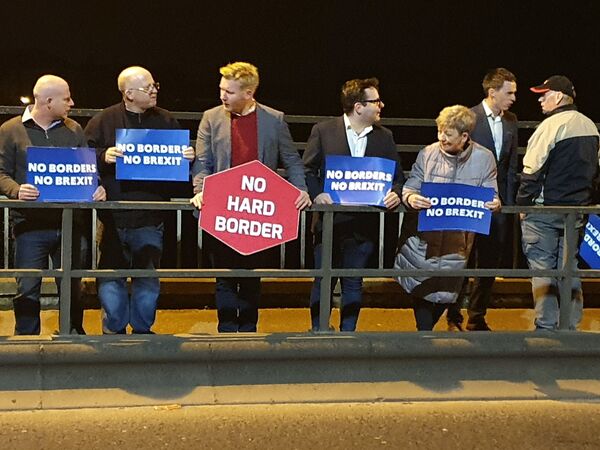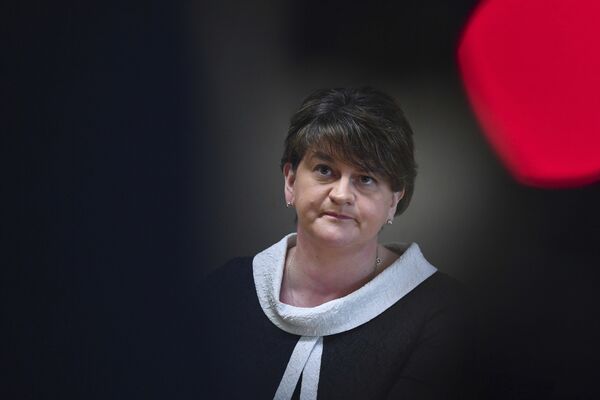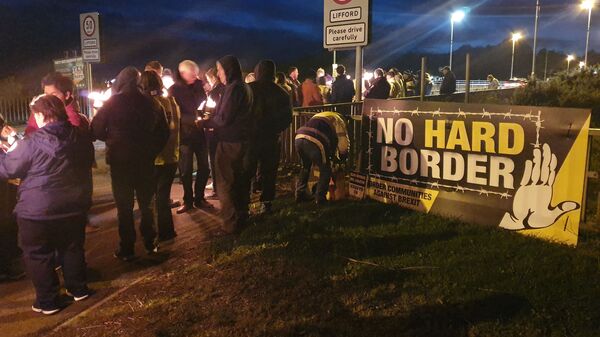Hundreds of demonstrators carried out a torchlight protest on Wednesday night against the reimposition of any sort of checks on the Irish border as part of the Brexit deal.
Stephen Kelly, the Chief Executive of Manufacturing Northern Ireland, an umbrella group which represents 550 manufacturers, said he feared Northern Ireland would be “collateral damage” as Boris Johnson and the Conservative Party sought to get out of the EU by 31 October.
Speaking to a Sputnik reporter in Derry, Mr Kelly said: “Northern Ireland and this city in particular is at the sharpest edge of Brexit. This city is surrounded on three sides by the border. Its market is Donegal. There are 37 border crossings in the city. Some houses have a border running between the kitchen and the living room.”
He said Theresa May’s government had engaged with the business community in Northern Ireland who had eventually given her deal, with the famous Irish “backstop”, their seal of approval.
But it was rejected three times by Parliament and she eventually resigned, to be replaced by Boris Johnson, who promised to get Britain out of the EU by 31 October “with or without a deal.”
“This time round there has been no engagement with the business community. We are going to be bounced with this document and asked to give our view on it with only a few hours to spare. At this point in time we don’t know if it works,” Mr Kelly said.

He said: “It looks like we are going to be presented with a huge set of costly administrative burdens which could potentially have the same effect as a no deal. We have deep concerns. Northern Ireland employers and the economy is being thrown under a bus. We will take all the pain so the rest of the UK can carry on.”
Mr Kelly blamed a small group of English nationalists within the Conservative Party.
“If you are Jacob Rees-Mogg or Bill Cash or Steve Baker or Mark Francois and you have built your whole career on getting out of the EU you don’t care what the damage is to the rest of the UK. There are a raft of MPs who know it’s dangerous but they may are in Leave constituencies and they want to save their own jobs,” Mr Kelly said.
This feels like Brexit negotiations yes? https://t.co/u3YEOnjcee
— Jane Merrick (@janemerrick23) October 16, 2019
On Wednesday night, as the two sides negotiated in Brussels, hundreds of protesters gathered at about 30 Irish border crossings to register their disgust at the idea of reimposing border controls which were abolished in the 1990s.
On the bridge over the river Foyle, halfway between Lifford in the Irish Republic and Strabane in Northern Ireland, truckers and motorists hooted in support of dozens of demonstrators armed only with placards and torches who voiced their anger at the idea of a “hard border”.
Gerry Rush, a retired lorry driver, and his wife Eilish remembered having to fill in reams of paperwork before January 1993 when the introduction of the Single Market meant customs checks were no longer needed on the Irish border.
Mr Rush, who used to transport potatoes from Donegal to Derry and livestock from Northern Ireland to Tipperary, said: “The majority of people do not want any border controls. The majority of people in Northern Ireland actually voted to stay in the European Union. It affects both communities. This is not sectarian. We are getting a lot of support from truckers and farmers who don’t want to see a border. There are two markets in Donegal and farmers from both sides go and sell their produce.”
Sinn Fein, who are reportedly behind the Communities Against Brexit group, have campaigned since the 1970s for a united Ireland.
Paul Gosling, a financial journalist based in Derry, thinks the consequences of Brexit could well play into Sinn Fein’s hands.
We have reached the most important point in the Brexit negotiations. The bit where we haggle with the DUP over how much money they want for their votes.
— Parody Boris Johnson (@BorisJohnson_MP) October 15, 2019
He said: “Brexit changes things as far as the arguments for a united Ireland. If we have a hard Brexit with a negative outcome for Northern Ireland while the southern economy continues to prosper people will see the benefits of joining the south. But if you have a soft Brexit it will reduce the border but strengthens the idea of a united Ireland. More people in Northern Ireland feel that people in England really don’t care about them. English nationalism cares more about England than Scotland or Northern Ireland. Brexit is more important to them than Scotland or Northern Ireland staying in the union.”

Mr Gosling said part of the problem in Northern Ireland was that both the main parties were rudderless.
He said: “Neither the DUP or Sinn Fein have an effective political strategy. Sinn Fein is still dealing with the consequences of Martin McGuinness dying and turning to new leaders and the DUP is dealing with the absence of Peter Robinson (who retired in 2015 and handed over to Arlene Foster) who they relied on for years for strategy.”
Mr Gosling said: “The logic of Brexit was that you would have a border in the Irish Sea and that is what the DUP didn’t want. There was an inconsistency in their position but it was not obvious to themselves. People like Sammy Wilson and Nelson McCausland have always been right-wing and anti-EU and because Arlene Foster believed there was no chance of Brexit (before the referendum) she let them get on with it.”


